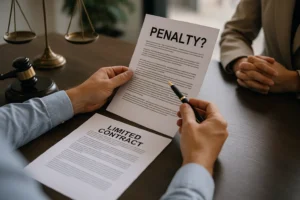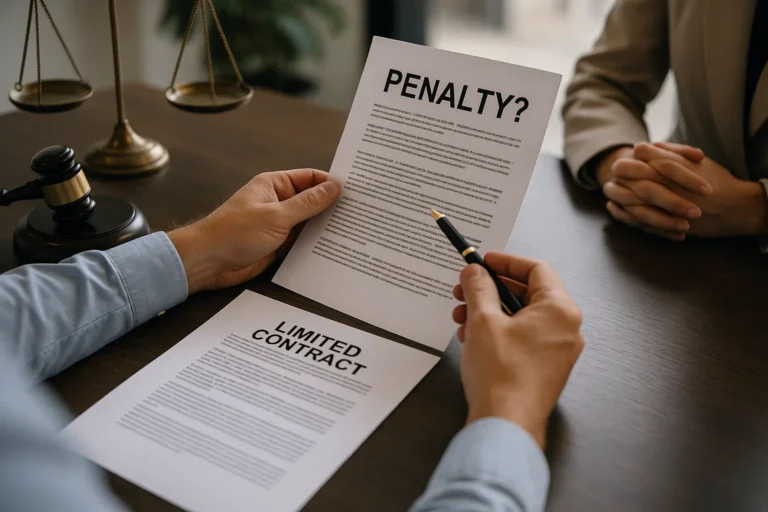Dubai is one of the most attractive destinations in the world for business expansion. With a strong economy, world-class infrastructure, tax benefits, and a diverse, high-spending population, it’s no surprise that international brands frequently look to franchise their businesses in the emirate. But for many foreign companies, the key question remains: Can a foreign company legally franchise its business in Dubai?
The answer is a clear yes—foreign companies can franchise their business in Dubai, provided they comply with the UAE’s legal and regulatory framework. However, franchising in a foreign jurisdiction always carries complexities, and Dubai is no exception. Navigating local laws, structuring agreements, registering intellectual property, and ensuring proper licensing all require expert handling.
In this guide, we’ll walk through how foreign businesses can legally franchise in Dubai, outline the steps involved, and explain the essential role of experienced lawyers in Dubai in facilitating a smooth and compliant market entry.
Why Foreign Companies Are Franchising in Dubai
Dubai’s business ecosystem is exceptionally conducive to franchising. Here’s why:
- 100% foreign ownership is permitted in many business sectors.
- Free zones allow easy and fast business setup with limited bureaucracy.
- Dubai is a global tourism and shopping hub, creating demand for international brands.
- High consumer spending, especially in sectors like F&B, retail, education, health, and beauty.
- The city offers political stability and modern infrastructure, attracting long-term investments.
As a result, global brands—from American fast-food chains to European fashion labels and Asian education providers—are actively entering the UAE market through franchising.
Legal Framework for Franchising in Dubai
Dubai does not have a standalone “franchise law.” Instead, franchising is governed through a combination of the following:
- UAE Civil Transactions Law
- UAE Commercial Transactions Law
- UAE Intellectual Property and Trademark Law
- UAE Commercial Agency Law (in specific cases)
- Free zone regulations (for businesses established in free zones)
The absence of a dedicated franchise law means that legal clarity must come from careful contract drafting, proper registrations, and compliance with sector-specific rules. This is where the involvement of lawyers in Dubai becomes essential for foreign companies.
Steps for Foreign Companies to Franchise Their Business in Dubai
1. Assess Market Feasibility and Business Readiness
Before entering any new market, foreign franchisors must evaluate:
- Market demand for their product/service
- Local competition and consumer preferences
- Cultural factors affecting brand perception
- Regulatory limitations in the sector (e.g., food, education, finance)
Legal advisors often work in conjunction with market analysts to evaluate feasibility and identify any legal or structural barriers early on.
2. Register Trademarks in the UAE
The most critical step for any foreign franchisor is registering trademarks locally. A foreign trademark registration in the home country does not protect your brand in the UAE.
The trademark must be registered with the Ministry of Economy in the UAE to:
- Prevent unauthorized use
- Enable legal enforcement in case of infringement
- License the IP legally to franchisees
Lawyers in Dubai assist with
- Trademark availability searches
- Filing applications in appropriate classes
- Handling objections or oppositions
- Renewals and enforcement
Without trademark protection, a foreign company cannot legally grant franchise rights in Dubai.
3. Draft a Legally Compliant Franchise Agreement
Franchise agreements are the backbone of the franchising relationship. For foreign companies, it is critical to localize the agreement to align with UAE legal principles.
Key elements include:
- Scope of the franchise
- Territorial rights (exclusive/non-exclusive)
- Payment structures (fees, royalties, marketing contributions)
- Training and operational support
- Quality control and brand standards
- Duration, renewal, and termination clauses
- Governing law and dispute resolution mechanisms
Franchise agreements must also be translated into Arabic for official use and, in some cases, notarized.
Lawyers in Dubai ensure the agreement is
- Aligned with UAE civil law
- Free of clauses that would be unenforceable locally
- Clear, protective, and legally valid
They also advise on whether your franchise structure risks being classified as a commercial agency (see next step).
4. Understand the Implications of UAE Commercial Agency Law
In the UAE, if a franchise relationship grants a local party exclusive distribution rights, and the agreement is registered with the Ministry of Economy, it may fall under Commercial Agency Law. This can trigger:
- Statutory protections for the franchisee (agent)
- Restrictions on terminating the agreement
- Dispute resolution jurisdiction shifting to UAE courts
Foreign franchisors often avoid registering under the commercial agency regime to retain flexibility. However, this depends on the structure of the franchise, and lawyers in Dubai can help determine:
- Whether the franchise qualifies as a commercial agency
- If so, whether registration is advisable
- How to structure the agreement to avoid unintended consequences
5. Choose the Right Business Setup Option
Foreign companies can enter the Dubai market through different structures:
a) Master Franchise Agreement
Granting a local partner the rights to operate and sub-franchise within a territory.
b) Area Development Agreement
Granting a local party rights to open a set number of outlets in a defined area.
c) Joint Venture
Partnering with a local investor to form a UAE entity.
d) Branch Office
Setting up a branch of the foreign company in Dubai (requires a local service agent unless in a free zone).
e) Free Zone Entity
Setting up a 100% foreign-owned company in one of Dubai’s many free zones.
Lawyers in Dubai help you assess the best option, considering
- Ownership preferences
- Regulatory obligations
- Licensing ease
- Long-term control over brand and operations
They also assist in preparing incorporation documents, obtaining trade licenses, and securing necessary regulatory approvals.
6. Obtain Trade Licenses and Sector-Specific Approvals
Depending on your chosen business activity, you’ll need a trade license from either:
- The Department of Economy and Tourism (DET) (for mainland)
- A Dubai free zone authority (e.g., DMCC, DIFC, DSO)
If you’re operating in regulated sectors like food & beverage, education, or healthcare, you may also need approvals from:
- Dubai Municipality
- Dubai Health Authority (DHA)
- KHDA (for schools and training centers)
- Food Safety Department
Experienced lawyers in Dubai handle license applications, review compliance requirements, and liaise with authorities to streamline the process.
7. Ensure Ongoing Legal Compliance
Once operational, your franchise must remain compliant with:
- Employment and labor laws
- Tax (including VAT) regulations
- Commercial contracts
- Consumer protection laws
- Advertising guidelines
- IP protection and renewals
Franchisors and franchisees often retain lawyers in Dubai for ongoing legal counsel, contract management, and dispute resolution, ensuring smooth business operations.
Common Mistakes Foreign Companies Should Avoid
- Using Foreign Franchise Templates Without Local Adaptation
These often include unenforceable clauses or omit key UAE requirements. - Failing to Register Trademarks
Operating without local trademark protection leaves your brand vulnerable. - Overlooking Agency Law Risks
Granting exclusivity without understanding its implications can lead to legal traps. - Choosing the Wrong Legal Structure
This can create tax inefficiencies or restrict your operational control. - Not Consulting Lawyers in Dubai Early
Legal support from the outset saves time, prevents risk, and ensures compliance
Foreign companies absolutely can franchise their business in Dubai—and many are doing so with great success. However, entering the UAE market requires more than just a brand and a business plan. It requires a solid understanding of local laws, careful structuring of agreements, and proper legal registrations.By working with trusted lawyers in Dubai, you ensure that your franchise operation is not only legally compliant but also positioned for long-term growth and profitability. From the first consultation to post-launch support, legal professionals play a crucial role in transforming your brand’s expansion into a secure and thriving business in the heart of the Middle East.







